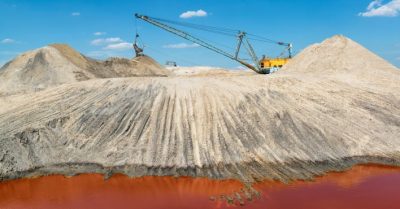U.S. Strategic Interest in Ukraine: Control over Extensive Titanium Reserves

All Global Research articles can be read in 51 languages by activating the Translate Website button below the author’s name.
To receive Global Research’s Daily Newsletter (selected articles), click here.
Follow us on Instagram and Twitter and subscribe to our Telegram Channel. Feel free to repost and share widely Global Research articles.
***
Although US President Joe Biden’s policy on Russia is guided by the interests of the American military industrial complex and his son’s business activities in Ukraine, the US also has other special interests in the Eastern European country, especially relating to titanium.
Newsweek magazine revealed that the US and its NATO allies have an interest in Ukraine’s large titanium reserves. This is because Ukraine is one of seven countries that produces titanium sponge, the basis for making titanium plates. China, which represents 57% of global ore production, and Russia, with 13%, are also part of the select group.
The location of these reserves adds a geographic factor for the US to contend with and puts the country in a delicate situation as it imports more than 90% of titanium for its aviation, technology, and weapons industry. The volatility is only heightened because Washington is waging a trade war against Moscow and Beijing through sanctions.
Furthermore, the US no longer has titanium sponge in its national defence stockpile and the last domestic producer closed in 2020. Washington made this decision despite the fact that titanium is among the 35 minerals of great importance to its economy and national security.
From a more practical point of view, titanium is a critically important metal as it is extremely resistant. Just as importantly, it is 45% lighter than other resistant materials, such as steel. For these reasons it has been widely used for producing military equipment, such as planes, war helicopters, ships, tanks and even long-range missiles.
“[Titanium] is a key vulnerability. We’re talking about our ability to produce more planes, we’re talking about our ability to produce munitions. They all rely on titanium, and we’ve allowed ourselves to grow reliant on foreign suppliers for these things. Russia has previously been one of those primary suppliers,” a source close to the US defence industry told Newsweek.
This is one of the major reasons for the US’ interest in Ukraine. This is especially the case as it forms a part of the American strategy to become less dependent on countries it considers an adversary. For this reason, Washington wants to prioritize trade relations with Ukraine in this field.
It is worth noting that there are other Ukrainian resources that may be of interest to the US, such as corn, wheat and grains. However, the US is also interested in Ukraine’s oil, natural gas, steel, nickel, palladium and copper.
“Ukraine has really significant deposits of rare earth minerals, and if we play our cards right could actually be a really attractive alternative to Russian and Chinese sources, which is where a lot of dependency currently is,” one congressional staffer told Newsweek.
Washington found an ally in post-2014 coup Ukraine. The current Zelensky government has proposed to be a close partner of the US and the European Union, just like his predecessors since Maidan, and has actively sought to establish closer trade relations with the two actors.
According to Newsweek, “winning improved access to Ukrainian titanium will help the US in its simmering conflict with China, which policymakers expect to dominate the 21st century.”
However, for all the US’ hope surrounding Ukrainian titanium, the outcome of the war remains a major issue. According to the Kiev-based GMK Center in an article titled ‘Ukrainian titanium: the export of titanium ores from Ukraine decreased by 42% y/y in 2022’, the war in Ukraine “also affected the titanium industry, in particular, the mining of titanium ores and the production of titanium products.”
“Last year, the export volume of titanium ores decreased by more than 40%. In addition, the sanctions policy and the return to state ownership of titanium assets can lead to a redistribution of the market,” the author’s article added.
It is clear that the war has significantly affected the Ukrainian titanium industry and companies have not disclosed their production figures. According to market estimates though, production has significantly decreased. This should not be considered surprising when we know, in one example, that the Velta company was operating at only 50% of its capacity due to a decrease in electricity supplies.
The war has indefinitely postponed Ukraine’s strategic plans with the US in the titanium industry. Although Ukraine is one of the seven countries that produces titanium sponge and occupies a leading position in the global production and reserves of ilmenite ores, which is of huge interest to Washington, the war has uncertain outcomes and thus makes strategic planning in this industry difficult.
For example, Ukraine could lose all its Black Sea ports and most of its titanium reserves and industries to Russian forces. In such a scenario, it would be questionable whether the US would have the same enthusiasm for Ukrainian titanium.
What is evident is that the US has huge interests in Ukrainian titanium and was one of many reasons why Washington emboldened Ukraine to war with Russia. However, it is seemingly unlikely that Ukraine can be the titanium partner that Washington hopes, especially in the pursuit of replacing Russia and China.
*
Note to readers: Please click the share buttons above. Follow us on Instagram and Twitter and subscribe to our Telegram Channel. Feel free to repost and share widely Global Research articles.
Ahmed Adel is a Cairo-based geopolitics and political economy researcher.
Featured image is from InfoBrics

